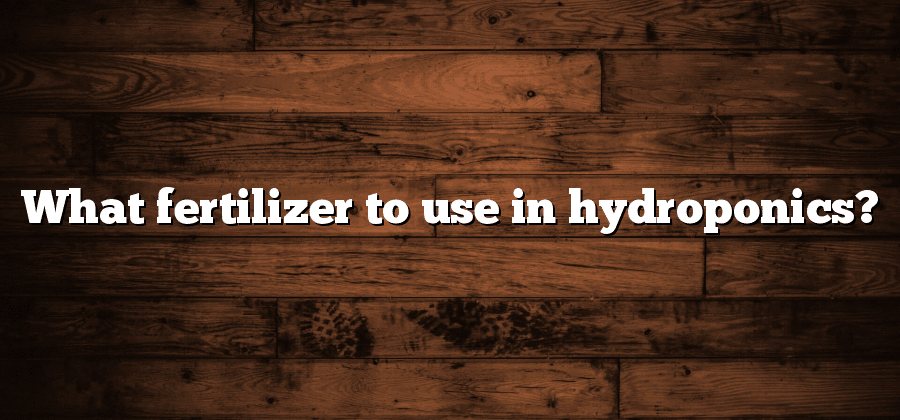Understanding Hydroponic Nutrient Requirements
Hydroponics, a soil-less gardening method, relies on a nutrient-rich solution to provide plants with the necessary elements for growth. Understanding the nutrient requirements is crucial in order to ensure optimal plant health and productivity. Hydroponic plants require a wide range of nutrients, including macronutrients and micronutrients, to support their growth and development. Macronutrients, such as nitrogen, phosphorus, and potassium, are required in larger quantities, while micronutrients, such as iron, manganese, and zinc, are needed in smaller amounts. Balancing the nutrient solution is essential to prevent deficiencies or toxicities that can hinder plant growth and reduce yields.
In order to determine the specific nutrient requirements of hydroponic plants, it is important to consider the plant species being grown, the growth stage, and the environmental conditions. Each plant has unique nutritional needs and may require different ratios of nutrients for optimal growth. Additionally, the nutrient requirements may vary depending on the growth stage of the plant. For example, during the vegetative stage, plants require higher levels of nitrogen to support leaf and stem development, while during the flowering and fruiting stages, phosphorus and potassium become more important for flower and fruit formation.
Exploring Essential Elements for Hydroponic Plants
Plants grown in hydroponic systems rely on a carefully balanced supply of essential elements to thrive and produce abundant yields. These elements, commonly referred to as nutrients, are necessary for various physiological processes, including photosynthesis, energy production, and overall plant growth. In hydroponics, where plants are cultivated in water-based solutions rather than soil, it is crucial to understand the specific nutrient requirements of different plant species.
The essential elements for hydroponic plants can be categorized into two main groups: macronutrients and micronutrients. Macronutrients, required in relatively large quantities, include nitrogen (N), phosphorus (P), potassium (K), calcium (Ca), magnesium (Mg), and sulfur (S). These elements are integral for plant growth and development, as they are involved in the synthesis of proteins, cell division, and enzyme activities. On the other hand, micronutrients, also known as trace elements, are needed in smaller amounts but are equally important. These micronutrients include iron (Fe), manganese (Mn), zinc (Zn), copper (Cu), molybdenum (Mo), boron (B), and chlorine (Cl), and they play essential roles in various enzymatic reactions and other biochemical processes within plants. By providing the right balance of these essential elements, hydroponic growers can ensure optimal plant health and maximize their crop yields.
Evaluating Different Types of Hydroponic Fertilizers
Hydroponic fertilizers play a crucial role in supporting the growth and development of plants in hydroponic systems. However, with a wide range of options available on the market, it can be challenging for growers to determine the most suitable fertilizer for their specific needs. When evaluating different types of hydroponic fertilizers, several factors need to be considered. Firstly, it is essential to assess the nutrient composition of the fertilizer. Different plants have varying nutrient requirements, and it is crucial to ensure that the chosen fertilizer provides the necessary elements in the right proportions. Secondly, the solubility of the fertilizer should be taken into account. A highly soluble fertilizer will dissolve quickly in the nutrient solution, ensuring that the plants receive the nutrients they need in a timely manner. Finally, the pH level of the fertilizer should align with the pH requirements of the hydroponic system to prevent any adverse effects on plant growth. By carefully evaluating these factors, growers can select the most suitable hydroponic fertilizer for their crops, ultimately optimizing their yield and overall plant health.
The Role of Macronutrients in Hydroponic Systems
Macronutrients play a crucial role in hydroponic systems as they are the primary nutrients required for plant growth and development. These macronutrients include nitrogen (N), phosphorus (P), and potassium (K), commonly known as NPK.
Nitrogen is essential for vegetative growth and helps in the formation of proteins and chlorophyll. It promotes leaf and stem development, resulting in lush and vibrant plants. Phosphorus, on the other hand, is crucial for energy transfer and is involved in root development, flower formation, and fruiting. It aids in the conversion of nutrients into a usable form for the plants. Lastly, potassium is necessary for overall plant health and plays a significant role in disease resistance, water regulation, and the transportation of nutrients within the plant.
These macronutrients need to be carefully balanced to ensure optimal plant growth. A deficiency or excess of any of these nutrients can negatively affect plant health and productivity. Periodic monitoring and adjustment of nutrient levels are essential to maintain a healthy hydroponic system and maximize crop yields. The next section will delve into the optimization of micronutrient levels for hydroponic crops, further enhancing our understanding of the nutrient requirements in hydroponic systems.
Optimizing Micronutrient Levels for Hydroponic Crops
Micronutrients play a crucial role in the growth and development of hydroponic crops. These essential elements are required by plants in relatively small quantities, but their absence or deficiency can have a significant impact on overall plant health and productivity. When optimizing micronutrient levels for hydroponic crops, it is essential to ensure that plants receive a balanced supply of these nutrients to support their various physiological processes.
One key consideration when optimizing micronutrient levels is the pH of the hydroponic solution. Different micronutrients have varying levels of solubility based on the pH of the nutrient solution. For instance, iron is less soluble in alkaline conditions, while manganese may become less available in acidic solutions. Therefore, it is crucial to monitor and adjust the pH of the nutrient solution regularly to maintain an optimal range for micronutrient availability to the plants. Additionally, it is important to source high-quality micronutrient fertilizers specifically formulated for hydroponic systems to ensure accurate dosing and reliable nutrient delivery to the plants.






